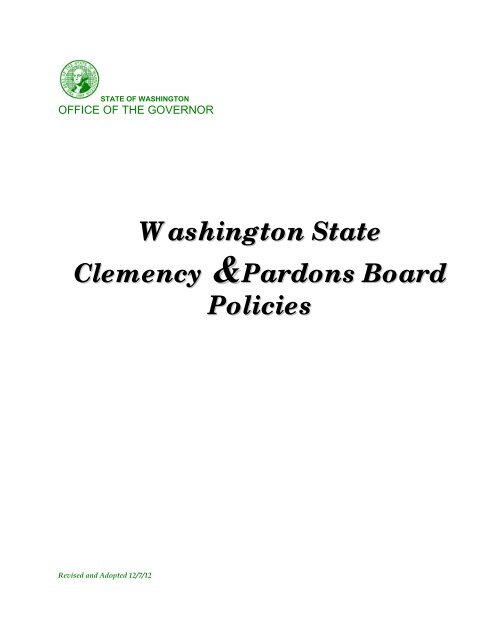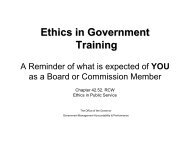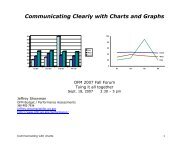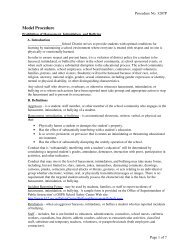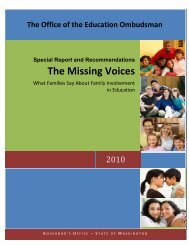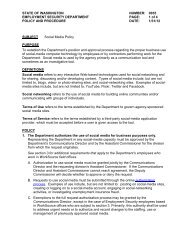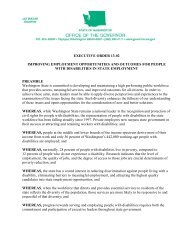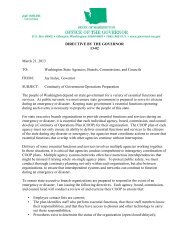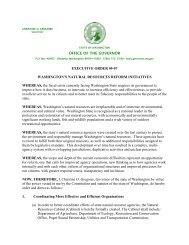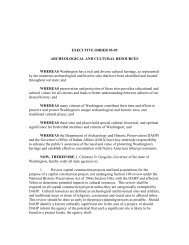Board policies (PDF) - Governor
Board policies (PDF) - Governor
Board policies (PDF) - Governor
You also want an ePaper? Increase the reach of your titles
YUMPU automatically turns print PDFs into web optimized ePapers that Google loves.
STATE OF WASHINGTON<br />
OFFICE OF THE GOVERNOR<br />
Washington State<br />
Clemency &Pardons <strong>Board</strong><br />
Policies<br />
Revised and Adopted 12/7/12
I. OVERVIEW OF THE CLEMENCY & PARDONS PROCESS<br />
The Washington State Constitution, Article III, Section 9, provides the <strong>Governor</strong> the authority to<br />
grant pardons, as does RCW 10.01.120 and RCW 9.94A.728(6). In addition, the <strong>Governor</strong> may<br />
grant an extraordinary release from incarceration under RCW 9.94A.728(4). The Clemency and<br />
Pardons <strong>Board</strong> (<strong>Board</strong>) has been established within the Office of the <strong>Governor</strong> pursuant to RCW<br />
9.94A.880 and RCW 9.94A.885. The <strong>Board</strong> receives Petitions from individuals and<br />
organizations for commutation of sentences and pardoning of offenders in extraordinary cases,<br />
and makes recommendations on those Petitions to the <strong>Governor</strong>. RCW 9.94A.885(1).<br />
The <strong>Board</strong> is also authorized to grant a petition to restore the right to engage in political office, if<br />
lost by operation of state law as a result of federal or out-of-state felony convictions. RCW<br />
9.94A.885(2). However, since most people’s right to vote would be restored by operation of<br />
law, and the right to engage in political office is ordinarily restored upon registration to vote, it<br />
would be unnecessary for the <strong>Board</strong> to take any action to restore the right to engage in political<br />
office. The <strong>Board</strong> is not aware of other circumstances in which the right to engage in political<br />
office is lost as a result of convictions for federal offenses or out-of-state felonies. However, a<br />
person who believes a petition for a certificate of restoration limited to engaging in political<br />
office is necessary due to unique circumstances, may explain the circumstances, request a copy<br />
of Petition for Restoration form, and the <strong>Board</strong> would consider the request.<br />
The <strong>Board</strong> consists of five members appointed by the <strong>Governor</strong>, subject to confirmation by the<br />
Senate. RCW 9.94A.880(1). Members of the <strong>Board</strong> serve terms of four years or until their<br />
successors are appointed. RCW 9.94A.880(2). The <strong>Board</strong> elects a chairperson and a vicechairperson<br />
from among its members. Members of the <strong>Board</strong> conduct hearings on a quarterly<br />
basis, or as needed, to review Petitions requiring <strong>Board</strong> consideration. Hearings are usually<br />
scheduled for the second Friday of the month in March, June, September and December.<br />
This document describes the <strong>Board</strong>’s <strong>policies</strong> and general procedures for receiving and<br />
considering Petitions from interested parties. Any procedure may be waived at the discretion of<br />
the <strong>Board</strong> if the particular circumstances warrant it. These <strong>policies</strong> are intended for guidance<br />
only and do not create, alter, or amend a right or benefit, substantive or procedural, for any<br />
individual or organization.<br />
II.<br />
PETITION FOR PARDON OR COMMUTATION<br />
The <strong>Board</strong> generally reviews and hears petitions for pardon or commutation only in cases in<br />
which judicial remedies for the conviction have been concluded to a final decision. This<br />
generally means that a Petition will not be heard until all direct appeals have been exhausted or<br />
until the time within which to appeal has expired.<br />
In addition, the <strong>Board</strong> ordinarily does not hear new Petitions from the same individual on the<br />
same matter until three years have elapsed. The <strong>Board</strong> may make exceptions where the<br />
circumstances are exceptional or where there is new information.<br />
1
A. Form of Petition<br />
The <strong>Board</strong> has implemented the efficiency of a paperless process by transitioning to providing<br />
and receiving <strong>Board</strong> related materials in electronic format. If you have access to a computer and<br />
the internet, you may obtain a Petition form and review instructions by visiting the <strong>Board</strong>’s<br />
website at http://www.governor.wa.gov/office/clemency/. You may also contact the <strong>Board</strong>’s<br />
staff by email at CP<strong>Board</strong>@atg.wa.gov. If you do not have access to a computer and the<br />
internet, you may continue to communicate via the United States Mail to the Washington State<br />
Clemency and Pardons <strong>Board</strong>, c/o Terri Gottberg, Office of the Attorney General, PO Box<br />
40116, Olympia, Washington 98504-0116, or call (360) 586-0047.<br />
It is important that the Petitioner provide as much detailed information as possible in response to<br />
the questions on the Petition form. [In addition, a Petitioner who wishes to have his or her<br />
medical records reviewed must sign a medical records release that complies with the applicable<br />
health care records and confidentiality laws and rules allowing the <strong>Governor</strong>, the <strong>Board</strong>, the<br />
Attorney General’s Office (AGO), and the AGO’s staff permission to review the Petitioner’s<br />
medical history. This is particularly necessary for a petition for extraordinary release from<br />
incarceration under RCW 9.94A.728(4). In other cases, other waivers or releases may be<br />
requested. The appropriate waiver form is included in the Petition packet.]<br />
B. Consideration of Petitions<br />
In determining what recommendation to make to the <strong>Governor</strong>, the <strong>Board</strong> focuses on the<br />
existence or non-existence of “extraordinary” circumstances, pursuant to RCW 9.94A.728(4) and<br />
RCW 9.94A.885(1). The Petitioner should demonstrate why his or her circumstances are<br />
extraordinary and warrant the exercise of the <strong>Governor</strong>’s discretionary pardon power.<br />
Washington law does not define “extraordinary” circumstances, and there is no limitation on the<br />
factors the <strong>Board</strong> may consider in making its recommendation to the <strong>Governor</strong>. Petitioners<br />
should submit to the <strong>Board</strong> information and supporting documentation related to any factors that<br />
demonstrate that the circumstances are extraordinary and warrant relief. Examples of factors that<br />
Petitioners have presented include the following:<br />
• The seriousness of the offense;<br />
• The impact on the victims;<br />
• Whether there is a significant and documented need for clemency;<br />
• Acceptance of responsibility, remorse, and atonement;<br />
• Personal development and positive life changes since the offense occurred;<br />
• The offender’s criminal history and other relevant background;<br />
• Whether the individual has complied with all obligations imposed by the court;<br />
• The amount of time elapsed since the offense occurred.<br />
• The risk or benefit to the community.<br />
2
III.<br />
REVIEW & HEARING PROCESS FOR PETITIONS FOR PARDON OR<br />
COMMUTATION<br />
A. Preliminary Review Committee<br />
Each petition is reviewed by the Preliminary Review Committee consisting of two <strong>Board</strong><br />
Members on a rotational basis. The Preliminary Review Committee considers whether the<br />
Petition may demonstrate the existence of extraordinary circumstances and warrant a hearing.<br />
On the vote of one member of the Preliminary Review Committee, the Petition will be scheduled<br />
for a hearing before the full <strong>Board</strong>. After review, the Petitioner receives notice of the decision of<br />
the Preliminary Review Committee.<br />
B. Notice to Interested Parties<br />
The following parties receive notice from the <strong>Board</strong> of Petitions for Pardon or Commutation:<br />
• Indeterminate Sentencing Review <strong>Board</strong> (ISRB): If the ISRB determines that a Petitioner<br />
is within its jurisdiction, it provides a case analysis to the <strong>Board</strong>.<br />
• Department of Corrections (DOC): Initially, the DOC provides the <strong>Board</strong> with the<br />
Petitioner’s criminal history and a Legal Face Sheet if the Petitioner is currently an<br />
inmate. If the Petition is scheduled for a hearing, the DOC provides a case analysis for<br />
cases not under the jurisdiction of the ISRB.<br />
• Prosecuting Attorney: The prosecuting attorney’s office then complies with its<br />
responsibilities under RCW 9.94A.885(3), which include notifying victims and survivors<br />
of victims so that they may participate in the hearing. United States Attorney’s Office:<br />
Receives notice in appropriate cases of Petitions set for hearing.<br />
• U.S. Immigration and Customs Enforcement: Receives notice in appropriate cases of<br />
Petitions set for a hearing.<br />
Also, the Petitioner receives notification prior to the hearing of the date, time, and location of the<br />
hearing.<br />
The law requires the prosecuting attorney of the county where the conviction was obtained to be<br />
notified at least thirty days prior to the scheduled hearing that a petition has been filed and the<br />
date and place at which the hearing on the petition will be held. The board may waive the thirtyday<br />
notice requirement in cases where it determines that waiver is necessary to permit timely<br />
action on the petition. In cases in which a death sentence is affirmed and a death warrant has<br />
been issued pursuant to RCW 10.95.160, a petition should be filed in time to allow a minimum<br />
twenty-day notice to the prosecuting attorney, who in turn provides notice to the survivors of<br />
victims.<br />
C. Hearing Process<br />
The <strong>Board</strong> considers the Petitions at regularly scheduled quarterly hearings. The hearings are<br />
open to the public. A court reporter will attend and transcribe all hearings. In addition to the<br />
petitions selected by the Preliminary Review Committee for hearing, the <strong>Governor</strong>, Chairperson<br />
3
or a majority of the <strong>Board</strong> may call a Special Hearing on a petition, in accordance with the<br />
Bylaws. At the hearing, the <strong>Board</strong> hears oral statements, deliberates, and makes a final decision<br />
concerning whether to recommend to the <strong>Governor</strong> that petitions be granted.<br />
D. Consideration of Late Submissions<br />
Prior to the scheduled hearing on a Petition, the <strong>Board</strong> reviews all documents submitted in favor<br />
and opposing the Petition. Additional submissions concerning a Petition set for hearing will not<br />
be accepted or considered by the <strong>Board</strong> if received after 5:00 p.m. on the Monday preceding the<br />
scheduled hearing on a Petition.<br />
1. General Introduction<br />
At the opening of each hearing, the Chairperson introduces each member of the <strong>Board</strong>, the <strong>Board</strong><br />
staff, legal counsel, and representatives from the DOC and ISRB. The Chairperson also provides<br />
a brief overview of the hearing process.<br />
The order in which Petitions are heard is determined by the <strong>Board</strong> and Staff. The order of<br />
Petitions on the <strong>Board</strong>’s Agenda is generally as follows:<br />
(1) Petitions for Pardon or Commutation involving Petitioners who are incarcerated<br />
and who will appear by telephone; and,<br />
(2) All other Petitions for Pardon or Commutation.<br />
2. Oral Presentations and Consideration of Facts<br />
The Petitioner, his or her representative, witnesses, the prosecutor or the U.S. Attorney and other<br />
interested persons may address the <strong>Board</strong>. If the Petitioner is incarcerated, he or she may arrange<br />
to make a statement by telephone. Pursuant to RCW 7.69 and 9.94A.885, victims and survivors<br />
of victims have the right to present statements in person, via audio or videotape, or other<br />
electronic means, or in writing, at any hearing on a Petition for Pardon or Commutation.<br />
The <strong>Board</strong> may limit the length of time and the number of individuals who may address the<br />
<strong>Board</strong>, other than as required by law.<br />
Among the areas of consideration, the <strong>Board</strong> may inquire into the underlying facts of the<br />
convictions, because doing so may assist in understanding the issues presented in the Petition.<br />
However, the hearing is not a forum to retry the conviction. A rare exception may be made if the<br />
law provides no judicial recourse for consideration by the courts of newly discovered and<br />
incontrovertible proof of actual innocence.<br />
3. <strong>Board</strong> Deliberations and Recommendation<br />
At the end of the oral presentations the <strong>Board</strong> deliberates and reaches a determination. The<br />
<strong>Board</strong> may recommend that the <strong>Governor</strong> deny the petition or grant the petition with or without<br />
conditions. Deliberations on the recommendation occur in the public hearing. Each member will<br />
4
vote and may explain his or her reasons for the recommendation. Petitioners and interested<br />
parties should not interrupt the deliberations process, but may answer any additional questions<br />
that the <strong>Board</strong> raises during its deliberations.<br />
After the <strong>Board</strong> has reached a decision, the Chairperson announces it and closes the <strong>Board</strong>’s<br />
record on the Petition. The recommendation is submitted to the <strong>Governor</strong>, who is not bound to<br />
follow the <strong>Board</strong>’s recommendation or take any action on the Petition.<br />
IV.<br />
ANNUAL CALENDAR FOR PROCESSING PETITIONS<br />
<strong>Board</strong> hearings are scheduled quarterly in the months of March, June, September and December,<br />
generally on the second Friday of the month.<br />
V. BOARD MEMBER’S IMPARTIALITY<br />
In order to maintain a clemency and pardons system that openly and objectively evaluates<br />
petitions before recommendations are made to the governor, a board member will not discuss a<br />
petition pending before the <strong>Board</strong>, or a matter anticipated to be presented to the <strong>Board</strong>, with<br />
anyone outside of the quarterly hearings. Please do not contact a member of the <strong>Board</strong> about a<br />
petition.<br />
<strong>Board</strong> members shall be impartial and make their recommendations solely on the record<br />
presented to them through the process established by the <strong>Board</strong>. <strong>Board</strong> members are required to<br />
disclose any real or perceived conflicts of interest or ex parte communication and shall disclose<br />
any such conflicts or communications on the record at the hearing. For purposes of this section,<br />
the term “ex parte” shall mean where, without notice, one or more interested parties is not<br />
present to participate in the communication.<br />
After disclosing a real or perceived conflict or ex parte communication, a <strong>Board</strong> member may<br />
either choose to recuse him/herself or may choose to continue in the proceeding if the <strong>Board</strong><br />
member believes he or she can exercise his or her statutory duty in a fair, impartial, and objective<br />
manner. Such recusal is an act taken by a <strong>Board</strong> Member of his or her own volition.<br />
VI.<br />
DISCRETIONARY POWERS OF THE BOARD<br />
Nothing in these Policies is intended or should be construed to limit the <strong>Board</strong>’s statutory<br />
authority to consider, hear, or make a recommendation to the <strong>Governor</strong> to grant or deny a<br />
Petition for pardon, commutation or restoration of rights.<br />
VII.<br />
AMENDMENTS TO THE POLICIES<br />
By majority vote, with a quorum present, the <strong>Board</strong> may adopt, amend, or repeal these <strong>policies</strong> at<br />
anytime it deems appropriate. Minor clerical changes may be made at the direction of the<br />
Chairperson without a vote of the <strong>Board</strong>.<br />
5
CERTIFICATION OF ADOPTION<br />
The undersigned Chairperson of the Washington State Clemency and Pardons <strong>Board</strong><br />
certifies that the above Policies, were adopted by the <strong>Board</strong> members and that the same do now<br />
constitute the Policies of the Clemency and Pardons <strong>Board</strong>, and that they supercede any prior<br />
Policies or Resolutions adopted by the <strong>Board</strong> or its predecessors.<br />
Dated this 22nd day of March, 2011.<br />
______________________________<br />
John Turner, Chairperson<br />
6
TABLE OF CONTENTS<br />
I. OVERVIEW OF THE CLEMENCY & PARDONS PROCESS ..........................................1<br />
II. PETITION FOR PARDON OR COMMUTATION .............................................................1<br />
A. Form of Petition .............................................................................................................2<br />
B. Consideration of Petitions ..............................................................................................2<br />
III.<br />
REVIEW & HEARING PROCESS FOR PETITIONS FOR PARDON OR<br />
COMMUTATION .................................................................................................................3<br />
A. Preliminary Review Committee .....................................................................................3<br />
B. Notice to Interested Parties ............................................................................................3<br />
C. Hearing Process .............................................................................................................3<br />
1. General Introduction ...............................................................................................4<br />
2. Oral Presentations and Consideration of Facts .......................................................4<br />
3. <strong>Board</strong> Deliberations and Recommendation ............................................................4<br />
IV. ANNUAL CALENDAR FOR PROCESSING PETITIONS ................................................5<br />
V. BOARD MEMBER’S IMPARTIALITY ..............................................................................5<br />
VI. DISCRETIONARY POWERS OF THE BOARD ................................................................5<br />
VII. AMENDMENTS TO THE POLICIES .................................................................................5<br />
i


